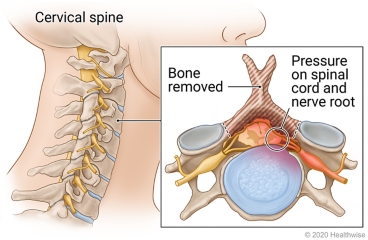
Your Recovery
You had a cervical laminectomy to relieve pressure on your spinal cord and/or the nerves in your neck. Your neck will probably feel stiff or sore. This should improve in the weeks after surgery. You may need pain medicine for a short time.
Your doctor may advise you to work with a physical therapist to strengthen the muscles around your neck and spine. You will need to be careful about what activities you do. Don't put too much strain on your neck.
This care sheet gives you a general idea about how long it will take for you to recover. But each person recovers at a different pace. Follow the steps below to get better as quickly as possible.
How can you care for yourself at home?
 Activity
Activity
- Your doctor may give you specific instructions on when you can do your normal activities again, such as driving and going back to work.
- Be active. Walking is a good choice.
- Rest when you feel tired.
- Allow your body to heal. Don't move quickly or lift anything heavy until your doctor says it is okay.
- You will probably need to take 2 to 4 weeks off from work. But if your job requires physical labor, it may take 4 to 8 weeks. It depends on the type of work you do and how you feel.
 Diet
Diet
- You can eat your normal diet. If your stomach is upset, try bland, low-fat foods like plain rice, broiled chicken, toast, and yogurt.
- If your bowel movements are not regular right after surgery, try to avoid constipation and straining. Drink plenty of water. Your doctor may suggest fiber, a stool softener, or a mild laxative.
 Medicines
Medicines
- Your doctor will tell you if and when you can restart your medicines. You will also get instructions about taking any new medicines.
- If you take aspirin or some other blood thinner, ask your doctor if and when to start taking it again. Make sure that you understand exactly what your doctor wants you to do.
- Be safe with medicines. Read and follow all instructions on the label.
- If the doctor gave you a prescription medicine for pain, take it as prescribed.
- If you are not taking a prescription pain medicine, ask your doctor if you can take an over-the-counter medicine.
 Incision care
Incision care
- If you have strips of tape on the cut (incision) the doctor made, leave the tape on for a week or until it falls off.
- Wash the area daily with warm water, and pat it dry. Don't use hydrogen peroxide or alcohol. They can slow healing.
- You may cover the area with a gauze bandage if it oozes fluid or rubs against clothing or your brace. Change the bandage every day.
 Exercise
Exercise
- Do neck exercises as instructed by your doctor.
- Your doctor may advise you to work with a physical therapist to improve the strength and flexibility of your neck.
 Other instructions
Other instructions
- Follow your doctor's instructions about wearing a brace or collar to support your neck.
- To reduce stiffness and help sore muscles, use a warm water bottle, a heating pad set on low, or a warm cloth on your neck. Do not put heat right over the incision. Do not go to sleep with a heating pad on your skin.
Follow-up care is a key part of your treatment and safety. Be sure to make and go to all appointments, and call your doctor if you are having problems. It's also a good idea to know your test results and keep a list of the medicines you take.
When should you call for help?
Call 911 anytime you think you may need emergency care. For example, call if:
- You passed out (lost consciousness).
- You have severe trouble breathing.
- You are unable to move an arm or a leg at all.
- You have symptoms of a blood clot in your lung (called a pulmonary embolism). These may include:
- Sudden chest pain.
- Trouble breathing.
- Coughing up blood.
Call your doctor now or seek immediate medical care if:
- You have new or worse symptoms in your arms or legs. Symptoms may include:
- Numbness or tingling.
- Weakness.
- Pain.
- You have pain that does not get better after you take pain medicine.
- You have loose stitches, or your incision comes open.
- You bleed through your bandage.
- You have symptoms of infection, such as:
- Increased pain, swelling, warmth, or redness.
- Red streaks leading from the incision.
- Pus draining from the incision.
- A fever.
Watch closely for changes in your health, and be sure to contact your doctor if:
- You do not have a bowel movement after taking a laxative.
- You are not getting better as expected.
Where can you learn more?
Go to http://www.healthwise.net/patientEd
Enter Z988 in the search box to learn more about "Cervical Laminectomy: What to Expect at Home".
Current as of: July 24, 2025
Author: Ignite Healthwise, LLC Staff
Clinical Review Board
All Ignite Healthwise, LLC education is reviewed by a team that includes physicians, nurses, advanced practitioners, registered dieticians, and other healthcare professionals.

